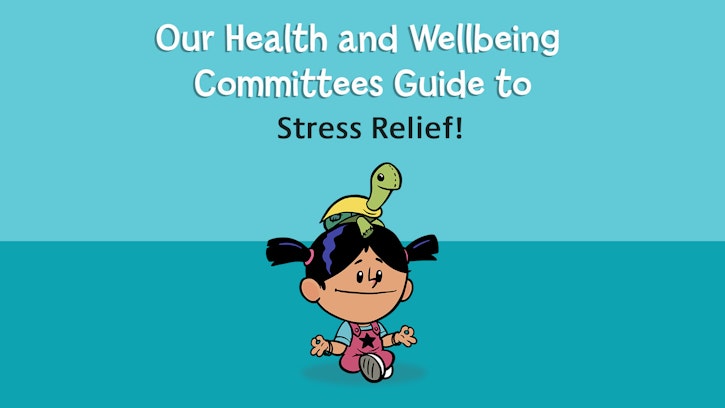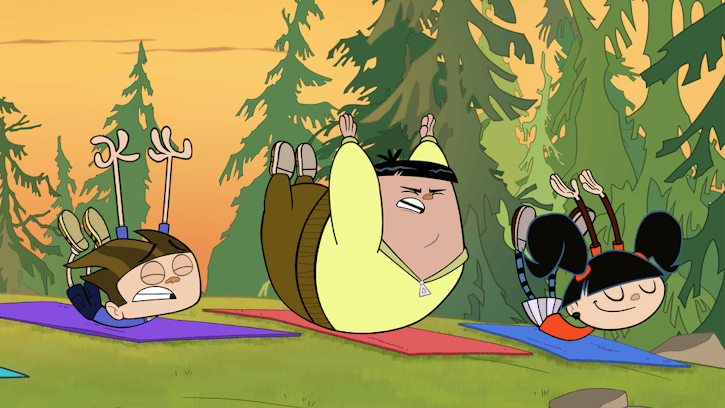April is Stress Awareness Month and our Health & Wellbeing Committees have been busy coming up with some useful tips to help with stress reduction along with some advice and resources to help us all stay healthy, cheerful and positive through this challenging time.
We know that with everything going on in the world right now, it's easy to get caught up in an anxious cycle but it's important to remember to take the time to focus on both our physical and mental health. We hope you'll find our tips below helpful and as always please feel free to share your own with us too!

1. Breathing Techniques
If you find yourself suffering from bouts of anxiety, one tried and tested method to help is simply breathing! This sounds too simple to be effective but trust us, when done properly breathing techniques can improve immune system function, anxiety and also reduce stress.
There are lots of great resources available online that discuss breathing techniques, we've found some of the below methods very helpful:
- How to Reduce Stress with the 2:1 Breathing Technique
- The Wim Hof Breathing Tutorial
- Ujjayi / Victorious Breathing in Yoga (technique to strengthen lungs with Ekhar Yoga)
- Full Yogic Breath, Basic Breathing Exercises, Yogalates with Rashmi
- 12-minute Meditation: Diaphragmatic Breathing with Living Better
2. Keep Your Immune System Strong
It's very easy to let simple things like eating and sleeping well slip up when you're under a lot of stress. But we're sure you'll agree a strong immune system is more important now than ever.
Make a commitment to staying strong by:
- Getting enough sleep
- Eating well and staying hydrated
- Taking vitamins
3. Stick to a Healthy Diet & Stay Hydrated
Diet is quite important in helping to reduce stress. In fact, anxiety and stress can be triggered by some processed and refined-carb foods. Cutting down on refined carbohydrates can help because certain foods can totally change the chemistry within our body. Studies have shown a relationship between the B vitamins and mood. Foods that are rich in Vitamin B can help to ease anxiety and increase energy.
It's also essential to stay hydrated. Dehydration can cause mood changes, and lowers your blood volume, so your heart needs to work harder to get enough oxygen to your cells, making ordinary activities, as well as exercise, more challenging. Take a look at this article for some of the many health benefits of drinking water: 7 Science-Based Health Benefits of Drinking Enough Water
4. Exercise and Stay Active
Staying active and doing regular exercis is not only beneficial for your physical health, but also your mental health.
Whether you're working from home or an office, make sure to periodically get up and move around. Incorporate some walking, stretching, planks or jumping jacks throughout your day—whatever works best for you to reduce or alleviate stress and increase endorphins.
While our favourite gyms and fitness centres are closed during this time, many are offering free livestreams or app-based workouts for members and the general public, so check online to see what's available. We've found the at home workouts with The Body Coach quite helpful.
5. Yoga & Meditation
Doing guided meditations and yoga can also help you relax and reduce stress. Our team organise a weekly yoga session during their lunch breaks, following along with online instructors, and you can do the very same! Why not get started with 30 Days of Yoga with Adrienne?
There are lots of great mediation apps available and one we've particularly enjoyed is Headspace, who offer some great free content.

6. Get Fresh Air
Your environment can strongly affect your stress levels, blood pressure and overall health. According to a recent study in the Journal of Epidemiology and Community Health, people who live close to green spaces have shown lower rates of depression, anxiety and poor physical health than those who reside in more urban settings.
If circumstances allow, make sure to incorporate going outside for a brisk walk and fresh air into your daily routine, but avoid crowds and try to maintain the recommended 6-foot distance with others.
7. Take Breaks from Media Consumption
It can be easy to get caught up in the never ending stream of media updates. While it's important to stay informed, it's also advised to avoid excessive exposure to news, media, and social media that may trigger or elevate anxiety, stress, or panic.
Stay up to date by following a few, authoritative resources, but try to keep your media consumption scheduled so that you don't overdo it.
8. Set Boundaries on Your Work Schedule to Reduce Stress at Work
When working from home, be sure that you are working reasonable hours. It can be tempting to work more with less breaks while you work at home, however, this can be taxing on your health and wellbeing. So stick to a schedule with healthy boundaries.
Try to think of healthy improvements you can make to your work day. Can you take your work call while you go for a walk outside? Can you update your status on whatever communication tools you use internally to show when you are available and when you're busy?
Habit forming is key so try to maintain a regular start and finish time each day. We find it helpful to end our day by writing up our to-do's for the following one. This also helps keep us organised and on top of our priorities.

9. Incorporate Self-Care into Your Routine
It's important that we take time out to take care of ourselves. It may sound simple but we can often neglect self-care in favour of looking after others, work or domestic chores.
Good self-care is essential to improved mood and reduced anxiety. We've found some of the resources listed below helpful in identifying simple activities we can add to our daily routines:
- 20 Ideas for Mental and Physical Health
- A Japanese Method to Relax in 5 Minutes
- Self-compassion, Kindness: How to be nicer to yourself
- Hugs Matter
And because we always love a good animation, here is one we found cute:
While it's important we maintain healthy social distancing at this time, why not give yourself that much needed hug and reap some of the many benefits of hugging including stress and anxiety relief!
We hope you find the above tips helpful, and in case you need it, we've also got some more useful tips on de-stressing curated especially for kids: Follow Along with Our Recipe for De-Stressing.
Stay healthy, happy and safe!
Anahita Tabarsi
Anahita is Brown Bag Films' Marketing Director, Digital & Social and drinks more than five coffees a day...
We Love Animation®
Brown Bag Labs is an exciting online space, brought to you by Brown Bag Films. We share great content for families as well as behind the scenes fun and tutorials from the Brown Bag Films team.



Get our great newsletter!
Get our great newsletter!